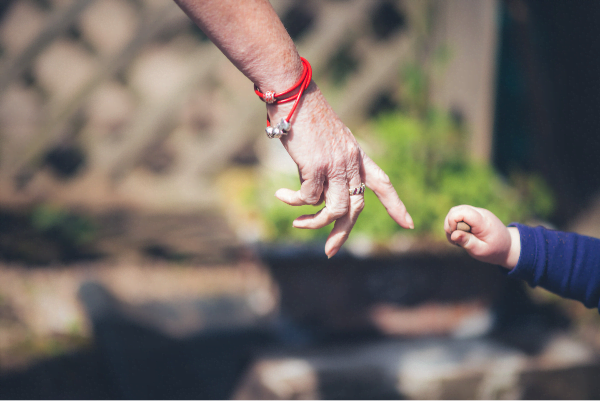It’s natural for grandparents to want to care for their grandchildren- their genetic relatives. The more they invest in their grandchildren, the more their genes are likely to spread in the subsequent generations.
With the economy getting increasingly competitive, parents are working more with little time to devote to raising children. So, it’s not uncommon to see grandparents playing a significant role in raising grandchildren, even raising them exclusively in some cases.
Children usually see their mother as a primary figure of attachment. But they can get attached to any caregiver, including grandparents.
The quality of these attachment relationships significantly impacts children’s self-esteem and mental health. For instance, a grandparent being abusive leads to the same psychological issues in the child as a parent being abusive.
Healthy vs unhealthy attachment
A child who attaches healthily to its primary and other caregivers typically grows to be a secure individual. Healthy attachment is characterized by mutual love, support, and respect.
In a healthy attachment, there’s a balance between closeness and distance. You’re close enough to gain emotional support but distant enough to be your own person.
Unhealthy attachment is characterized by too much closeness, such that the individuals get enmeshed with each other, losing their selves in the relationship. There’s no room for individuals to grow in such a relationship.
Grandparents who’re healthily attached to their grandkids benefit their mental health and everyone around them. They help the parents with parenting and contribute to the healthy development of grandchildren.
Grandparents who are unhealthily attached to their grandkids harm themselves and everyone around them. They have little time left to tend to themselves and their relationships. They interfere with the parenting of parents and stunt the development of grandchildren.
Signs of unhealthy attachment to grandchildren
Following are the signs of an unhealthy attachment to look out for in grandparents:
1. Lack of boundaries
Since overly attached grandparents are enmeshed with their grandchildren, they have no problems violating the boundaries of their grandkids. They’re overbearing, spend too much time with grandchildren, and invade their privacy.
2. Jealousy
A grandparent obsessed with their grandchild will not want the latter to spend time with others. They get jealous of the child’s other relationships.
3. Emotional dependence
Clingy and codependent people tend to emotionally over-depend on others. The same goes for overly attached grandparents. They may rely on the child for emotional support. That’s too much for a child to bear.
4. Spoiling the grandchild
While it’s natural and healthy to support your grandkids, overly attached grandparents take it too far. They shower their grandkids with money and gifts, hoping to win their love.
5. Overcontrol and over-involvement
Grandparents have a genetic stake in their grandkids. So they are going to involve themselves in the lives of their grandchildren. That’s inevitable.
With overly attached grandparents, the problem is that this involvement needs to be more. Just as parents can ruin the well-being of children by being over-controlling, so can grandparents.
6. Identifying with the grandkid
Again, it’s natural for grandparents to identify with their grandkids because it’s natural for humans to identify with their relationships. However, if a grandparent derives their entire identity, or a large part of it, from their grandkid, it points to deeper issues.
A grandparent who identifies too much with their grandchild will bask in the latter’s reflected glory. They’ll make the accomplishments of their grandchild their own.
Their identity isn’t well-diversified, meaning they have no other sources of self-worth. In other words, they haven’t got a life outside their grandkid.
7. Unrealistic expectations
With over-investment comes over-expectation. When we pay a high price for something, we expect high returns.
The same goes for human relationships. You can’t expect a friend you rarely talk to to help you in time of need. When you over-invest in a friend, you expect them to support you, too.
Grandparents don’t over-invest in their grandkids for nothing. Usually, they’re filling the needs for companionship and self-worth.
They may also expect too much from their grandkids- listening to their stories all the time, doing their chores, supporting them emotionally, and so on.
8. Undermining the authority of parents
It’s normal for parents to want to exercise some degree of authority over their children. Children can’t take care of themselves and need their parents.
An overly attached grandparent may undermine the authority of parents by breaking the rules the parents set for their children. For example, if parents give their child cookies once a week, a grandparent may break that rule ‘out of love’.
Doing so makes parents feel that the grandparent is over-interfering in their parenting and can cause conflict.
9. Resistance to change in the child’s life
As with parents, it can be challenging for grandparents to watch a child grow. Because as the child grows, they become less dependent and more interested in exploring the world.
The overly attached grandparent may feel less needed when the child goes to school in a new city and makes new friends. So, they might resist these changes, stunting the child’s healthy psychosocial development.

